Kantemirovsky Bridge
Kantemirovskiy Bridge[2] (Russian: Кантемировский мост) is a large modern[3] (built in 1979 - early 1980s) drawbridge (bascule bridge)[2] in Saint Petersburg, Russia across the Bolshaya Nevka[3] arm of the Neva river. The bridge connects the northern Aptekarsky Island (Apothecary Island) of the north-central Petrogradsky District on Petrograd Side with northeastern Vyborgskiy District of the city and over it with the northeast and east of Saint Petersburg. It receives automobile traffic from Bolshoy Prospekt (Petrograd Side) via Prospekt Medikov[4] in the southwest and takes it to Kantemirovskaya Street on the right-hand riverside, after which it was named. The street itself was named in 1952 after the railway station of a settlement of Kantemirovka in Voronezh region which was liberated from Nazi Germany troops by the Soviet Red Army in December 1942, which was a military achievement. The settlement in its turn was named after its 18 century owner Dimitrie Cantemir and his brother Constantin, Moldavian princes given shelter in Russia after a military defeat and entered into Russian nobility.
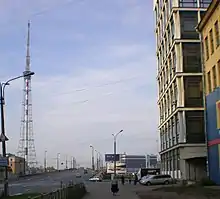
Kantemirovsky Bridge Кантемировский мост | |
|---|---|
Kantemirovsky Bridge Panorama | |
| Coordinates | 59°58′43″N 30°19′19″E |
| Carries | Motor vehicles, trolleybuses, pedestrians |
| Crosses | Bolshaya Nevka River |
| Locale | Saint Petersburg, Russia |
| Named for | Kantemirovskaya Street (Saint Petersburg) |
| Maintained by | Mostotrest Saint Petersburg bridge maintenance trust |
| Website | en |
| Preceded by | Rowing boat link |
| Next downstream | Ushakovsky Bridge |
| Characteristics | |
| Design | Bascule bridge |
| Material | Steel, concrete, granite, asphalt |
| Total length | 664 m (2,178 ft) |
| Width | 32.3 m (106 ft) |
| Longest span | 43 m (141 ft)[1] |
| No. of spans | 15 |
| History | |
| Architect | V. M. Ivanov & A. V. Govorkovsky |
| Designer | Lengiproinzhproject institute |
| Engineering design by | B. N. Brudno & B. B. Levin |
| Construction start | 1979 |
| Inaugurated | 1982 |
| Location | |
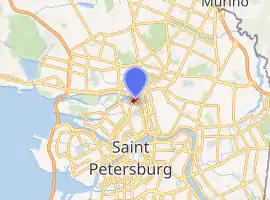
| |
History
It was built in 1979-82[4][3] as a part of a citywide thoroughfare street chain project at a place without a previous bridge:
Previously, there was no bridge link here. The need to build a new bridge arose because of the construction of an internal transport highway in the city, which starts from Tsiolkovsky Street, runs along the northern side of the Obvodny Canal with access to Alexander Nevsky Bridge and then along Zanevsky Prospect to the bridge across the Okhta River in the alignment of Energetikov Avenue, then along Annikov Avenue to Kantemirovskaya Street, in the alignment of which Kantemirovsky Bridge is located, and then across Aptekarsky Island to the Petrograd Side to the area of Kamennoostrovsky Bridge.
— Committee for the development of transport infrastructure of St. Petersburg City Administration, Кантемировский мост, Kantemirovskiy bridge. Website of Committee for the development of transport infrastructure of St. Petersburg
There used to be a boat connection in its place since early 19 century.[4]
Neighborhood objects of interest
Petrograd Side
- Saint Petersburg TV Tower, the tallest structure of the city from the 1960s until the completion of the Gazprom office skyscraper Lakhta Center.
.jpg.webp)
- Pyotr Stolypin assassination attempt obelisk[5] on the site of his country house
- Saint Petersburg Botanical Garden
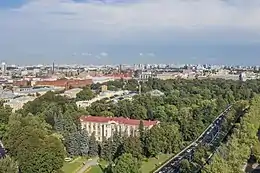
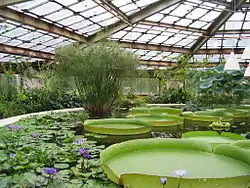
- St Petersburg Museum of Avant-garde (Matyushin's House)[6] (see Avant-garde, Mikhail Matyushin), a branch of State Museum of the History of St. Petersburg (Rus.Музей петербургского авангарда).
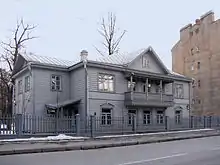 Matushin house
Matushin house - Saint Petersburg Electrotechnical University[7] with physicist co-inventor of the radio Professor Alexander Popov's Museum[8] Apartment and Laboratory in the street named after him.
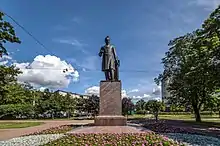 Monument to Popov further away
Monument to Popov further away
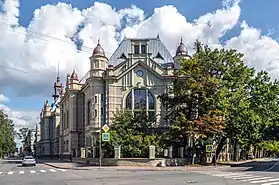
- Museum of the History of Photography (MHP)[9] (Rus. Музей истории фотографии).
Vyborg Side
.jpg.webp)
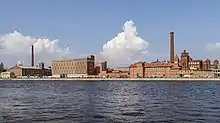
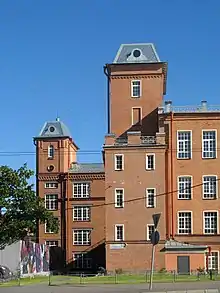
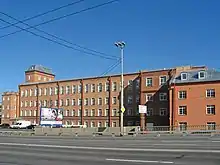
- Higher School of Economics Saint Petersburg campus red brick building[10] converted from a textile[11] mill[12] (Rus. pre-1917 Никольская мануфактура; Voronin, Lutz and Chesher Co. weaving building; in the Soviet times nationalised as "Красный маяк" (Krasniy mayak "Red Lighthouse").
- In front of it a modern sculpture of a red sitting human[13] created by[14] a local artist and designer,[15] enthusiast of street art Andrey Lublinskiy (Russian: Андрей Люблинский) on his contract from Higher School of Economics, at whose another Saint Petersburg address he also teaches,[16] with more of his sculptures placed at both locations. Such sculptures of his have been copied and / or installed[15] elsewhere from Samara city on Volga and Perm city[17] in the Urals to China, sometimes without the author's knowledge.[14]
See also
Reading
- Бунин М. С. (1986). Мосты Ленинграда. Очерки истории и архитектуры мостов Петербурга — Петрограда — Ленинграда. Л.: Стройиздат.
- Горбачевич К. С., Хабло Е. П. (1996). Почему так названы?. p. 103.
- Sindalovskiy, Naum (1997). Городские имена сегодня и вчера. p. 54.
- Новиков Ю. В. (1991). Мосты и набережные Ленинграда. Л.: Лениздат. Сост. П. П. Степнов.
References
- "Кантемировский мост". krti.gov.spb.ru. Retrieved 2020-04-28.
- SiluetStudio. "Kantemirovsky Bridge, St. Petersburg - Mostotrest". en.mostotrest-spb.ru. Retrieved 2020-04-23.
- "Кантемировский мост". krti.gov.spb.ru. Retrieved 2020-04-23.
- "Кантемировский мост". Энциклопедия Санкт-Петербурга. Retrieved 2020-04-23.
- "Обелиск на месте покушения на Столыпина - Google Search". www.google.com. Retrieved 2020-04-24.
- "St Petersburg Museum of Avant-garde (Matyushin's House)". www.spbmuseum.ru. Retrieved 2020-04-24.
- "ETU "LETI"". SPbETU “LETI”. Retrieved 2020-04-24.
- "Museum". SPbETU “LETI”. Retrieved 2020-04-24.
- "MHP: About the Museum". www.photohismus.spb.ru. Retrieved 2020-04-24.
- "HSE Buildings". www.hse.ru. Retrieved 2020-04-24.
- "Никольская мануфактура АО "Воронин, Лютш и Чешер" - Фабрика Гука, Кирпичный, Архитектор Пирвиц фон Ф. К., Косяков Вас. А., Крыжановский Д. А., Кантемировская ул., 3к2". www.citywalls.ru. Retrieved 2020-04-24.
- "Новый корпус Высшей школы экономики за 0,5 млрд рублей открылся в фабричном здании". m.dp.ru. Retrieved 2020-04-23.
- Декоративная скульптура "Красный человечек" Санкт-Петербург, МО №12 "Сампсониевское" 2gis.ru Mapping Service
- ЦЫГАНКОВА, Вера (2018-11-24). "Их копируют даже в Китае: автор "красного человечка" удивился появлению своей скульптуры в Самаре". KP.RU - сайт «Комсомольской правды» (in Russian). Retrieved 2020-04-24.
- "Андрей Люблинский". spbdesignweek.ru. Retrieved 2020-04-24.
- "Андрей Люблинский - Стрит-арт в Петербурге / #ленинбург". YouTube.
- "Создатель красных человечков: "В Перми из них сделали политический инструмент"". Properm.ru. Retrieved 2020-04-24.